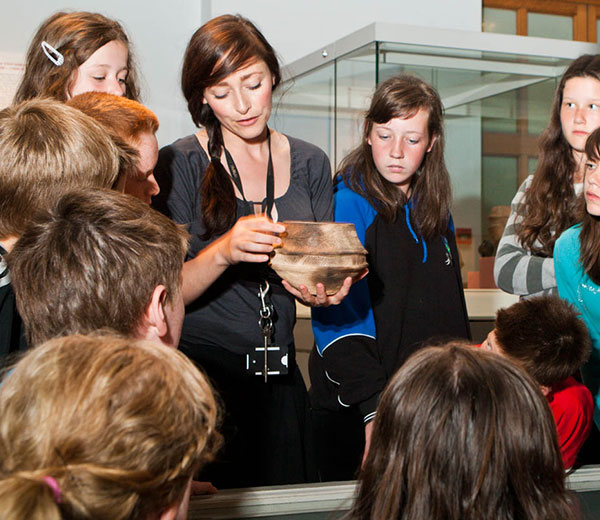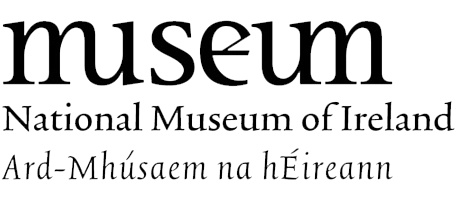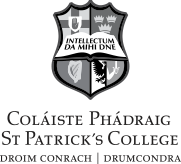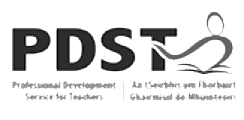What’s on offer for Schools at the Museum of Archaeology?
The Museum as a Centre for Learning
The Museum of Archaeology is a centre for learning and creativity for a range of audiences including young people in the formal education sector. The Museum's learning programme complements the primary and post primary curriculum across a range of subjects. The programme explores and encourages engagement with exhibitions that span more than 15,000 years of Irish heritage. Exhibitions display iconic artefacts from all over Ireland.
The Museum’s Learning Programme
The Education Department is vastly experienced in designing dynamic, participatory and engaging learning programmes to meet students’ learning needs. Activities such as theme based tours, art and object handling workshops, research projects, demonstrations and competitions are just some of the offerings for schools at the Museum of Archaeology. The Bronze Age and other periods of prehistory are explored and debated in the programmes and resources.
Diverse Learning Opportunities
Sensory-based learning through handling and art workshops present an unparalleled experience for students to connect with the Museum of Archaeology’s Collection. This experience introduces students to working with evidence and source material and develops an appreciation of the skills and technology used in the creation of artefacts, and insights and empathy with the peoples of the past.
Self-directed Learning Resources
There are also resources available for self-directed learning such as activity sheets and teachers' notes. These are readily accessible through the Museum's website at www.museum.ie and through the Bookings Offices in Dublin and Mayo.
How to Book a visit at the Museum?
If you intend to visit with your class, please let the Bookings Office know. For directions, floor plans and everything you need to know about booking your visit to our Dublin and Mayo Museums visit www.museum.ie.
Museum of Archaeology's Education Programme
The Museum offers a wide range of tailor made learning programmes that explore the Bronze Age and encourage engagement with artefacts from prehistoric Ireland.
Classroom Poster: The Raised Past
This poster shows how Irish bogs have been a rich source of archaeological evidence for life in the past, including the Bronze Age. Use this poster to discover the dates and find locations of iconic objects, including 35 find locations of Bronze Age artefacts in six different counties in Ireland. All visiting teachers are welcome to one of these posters. Just ask the Education Department at the Museum for your copy.
Activity Sheets
Find our free activity sheets on the ‘Explore and Learn’ pages of the Museum’s website, www.museum.ie. Designed for use within the Museum, these sheets are suitable for primary and post primary students and will help focus a group visit. Each sheet encourages students to observe, analyse, record and discover the answers to various questions as they explore the exhibitions. Activity sheets recommended to explore the Bronze Age exhibition displays are:
- My Favourite Object (Suitable for Primary)
- An Rud is Fearr Liom (Suitable for Primary)
- The Winter Trail (covers a number of time periods including the Bronze Age and is suitable for 5th/6th class and post primary)
More Online Resources
Floor plans, exhibition information, guidebooks and tips for making the most of your visit are all available for free to download from the Museum’s website www.museum.ie. The Bronze Age exhibits are on display in two exhibitions: ‘Prehistoric Ireland’ and ‘Ór Ireland’s Gold’. Included on the website pages are overviews of the exhibitions, main traits of the different time periods, names of significant artefacts and the techniques used to create them. More information on the education programme as well as pre and post visit ideas for the classroom can be found in the 'Explore and Learn' section of the Museum’s website.

 The Museum of Archaeology
The Museum of Archaeology Association of Teachers' / Education Centres in Ireland
Association of Teachers' / Education Centres in Ireland St Patrick's College, Drumcondra
St Patrick's College, Drumcondra Professional Development Service for Teachers
Professional Development Service for Teachers